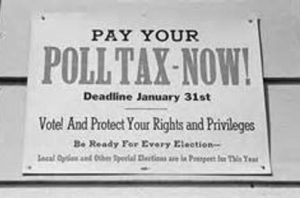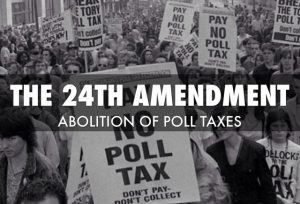 Those of us living today, might not have heard of a thing called a Poll Tax, but it was a very real thing, and with the election process just behind us, I think this might be something worth hearing. The Poll Tax was also known as a head tax or a capitation tax (meaning a tax for a head count). When I first thought about this particular tax, I thought well, maybe that kind of a tax could have ensured a fair election, but really, the opposite is true. While the head tax was considered an important source of revenue for many governments, from ancient times until the 19th century, in the United States at least; voting poll taxes (whose payment was a precondition to voting in an election) have been used to disenfranchise impoverished and minority voters (especially under Reconstruction). I find that absolutely unbelievable. In this nation in most election years, we have to practically beg people to get out and vote. Charging them money for it would all but insure a poor turnout. It would also insure that only those well enough off to be able to “throw money” at an election would be able to vote. Now that is truly appalling.
Those of us living today, might not have heard of a thing called a Poll Tax, but it was a very real thing, and with the election process just behind us, I think this might be something worth hearing. The Poll Tax was also known as a head tax or a capitation tax (meaning a tax for a head count). When I first thought about this particular tax, I thought well, maybe that kind of a tax could have ensured a fair election, but really, the opposite is true. While the head tax was considered an important source of revenue for many governments, from ancient times until the 19th century, in the United States at least; voting poll taxes (whose payment was a precondition to voting in an election) have been used to disenfranchise impoverished and minority voters (especially under Reconstruction). I find that absolutely unbelievable. In this nation in most election years, we have to practically beg people to get out and vote. Charging them money for it would all but insure a poor turnout. It would also insure that only those well enough off to be able to “throw money” at an election would be able to vote. Now that is truly appalling.
It is my understanding that originally the “poll tax” or maybe more correctly, head tax was not about an election, but more like the census. It even has Biblical roots…Mary and Joseph went to Bethlehem to be counted and pay their taxes to Caesar Augustus. This was the first of the head taxes. The tax might have been originally a way to bring in revenue. The poll taxes that followed, in most cases, were purely discriminatory.  These latter poll taxes ensured that only wealthy people got the chance to cast their vote…thereby putting in candidates that those in charge wanted.
These latter poll taxes ensured that only wealthy people got the chance to cast their vote…thereby putting in candidates that those in charge wanted.
While the Poll Tax might have been a way to bring in money for governments, it seems to me that it could also be a way to make sure that the people vote for the candidate the government wants. Those who might have voted for change to improve the situation in their own neighborhoods, towns, cities, and states, were usually the poorer people, but they couldn’t vote for someone who could help, because they didn’t have the money. Many of these people were minorities. Head taxes were important sources of revenue for many governments from ancient times until the 19th century. In the United Kingdom, poll taxes were levied by the governments of John of Gaunt in the 14th century, Charles II in the 17th and Margaret Thatcher in the 20th century. By their very nature, poll taxes are considered very regressive taxes, are usually very unpopular and have been implicated in many uprisings.
On August 27, 1962, the Twenty-fourth Amendment (Amendment XXIV) of the United States Constitution was proposed. The Twenty-fourth Amendment prohibits both Congress and the states from conditioning the right to vote in federal elections on payment of a poll tax or other types of tax. The amendment was ratified by the states on January 23, 1964. When the 24th Amendment was ratified in 1964, five states still retained a poll tax. Those states were Alabama, Arkansas, Mississippi, Texas, and Virginia. These states continues the practice  even though the amendment prohibited requiring a poll tax for voters in federal elections. Finally, in 1966 the US Supreme Court ruled 6–3 in Harper v. Virginia Board of Elections, that poll taxes for any level of elections were unconstitutional. The ruling stated that the poll tax violated the Equal Protection Clause of the Fourteenth Amendment. Further litigation related to potential discriminatory effects of voter registration requirements has generally been based on application of this clause. Those of us living today, might not have heard of a thing called a Poll Tax, but it was a very real thing, and with the election process just behind us, I think this might be something worth hearing. The Poll Tax was also known as a head tax or a capitation tax (meaning a tax for a head count).
even though the amendment prohibited requiring a poll tax for voters in federal elections. Finally, in 1966 the US Supreme Court ruled 6–3 in Harper v. Virginia Board of Elections, that poll taxes for any level of elections were unconstitutional. The ruling stated that the poll tax violated the Equal Protection Clause of the Fourteenth Amendment. Further litigation related to potential discriminatory effects of voter registration requirements has generally been based on application of this clause. Those of us living today, might not have heard of a thing called a Poll Tax, but it was a very real thing, and with the election process just behind us, I think this might be something worth hearing. The Poll Tax was also known as a head tax or a capitation tax (meaning a tax for a head count).


2 Responses to The Poll Tax